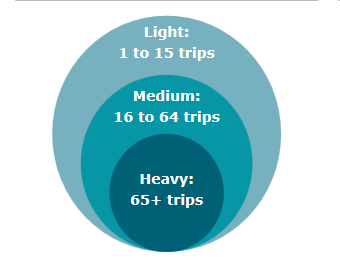Food waste less likely with frozen food in the USA
Frozen food plays an important role in the USA for consumers. The American Frozen Food Institute (AFFI) now wants to get more involved in the US National Strategy for Reducing Food Loss and Waste.
Frozen food is a permanent element of consumption in the USA. On a year-to-year basis (June 2022/June 2023), total spending on frozen food reached US$75 billion (approximately €68.7 billion), up 7.8% from the previous year, according to a research booklet conducted by the American Frozen Food Institute (AFFI) in cooperation with Alixpartners in 2023.
A US$75 billion market in the USA in 2023
According to the research, sales of frozen food were driven by meat, poultry and seafood (29%) followed by entrees/appetizers/snacks (23%) and frozen desserts (20%). Private label brands held a share of approximately 25% of all frozen retail dollars. With inflation cooling, the segment is projected to see growth slowing from 8.8% to 4.4% in 2024.

Looking at American consumers, the AFFI found that 68% of households are medium frozen food shoppers (16 to 64 trips per year with an average annual spending of US$603.34 (approximately €552.55). By comparison, light shoppers spent US$147.40 (approximately €135) while heavy shoppers’ bill climbed to US$1483.99 (approximately €1,358.89).
The importance of frozen dishes in the life of Americans explains why the AFFI -in coordination with other institutions and organisations such as the Global Cold Chain Alliance, the Meat Institute and the National Fisheries Institute, wants to be a driver in fighting food waste in the USA. They all want to see the segment playing a leading role in meeting the federal government’s sustainability goals in support of the proposed draft of the National Strategy for Reducing Food Loss and Waste and Recycling Organics.
“Whether at the retail, food service or consumer level, frozen food helps prevent food loss and waste,” said Alison Bodor, AFFI President and CEO.

Jumping on the bandwagon of food waste prevention
The organisations emphasised several important points and areas for enhancing the National Strategy, including:
- Education: The organisations support a national consumer education and behaviour change campaign to reduce food waste that showcases the ways frozen dishes can help consumers achieve this goal.
- Investment: An increased investment in expanding and modernising the nation’s cold chain infrastructure will improve access to frozen food products – especially for under-served communities – and have a positive impact on food and nutrition security.
- Health Equity: Consistent with the draft of the strategy’s goal of reducing barriers to improve food access and affordability, the federal government should recognise the role frozen dishes plays in supporting health equity.
- Nutrition Security: Frozen foods provide a conduit to healthy eating. The freezing process naturally locks in nutrition, allowing consumers to easily access nutritionally dense food year-round. Moreover, studies show that frozen fruits and vegetables are as rich in nutrients as, and in some cases more so than, fresh-stored produce.
- Research: The draft of the strategy should continue supporting research efforts that seek to identify best practices in collecting data about the level of consumer food waste.
Research shows that frozen food helps consumers reduce their amount of food waste as it has a longer shelf-life and can be portioned. In a 2022 study conducted by AFFI, consumers reported that frozen dishes helped them reduce waste and save money, and that having frozen meal ingredients on hand helped to have more food in the house without risk of spoilage.
Frozen food also helps under-served populations access varied, balanced and nutrient-dense foods and saves them money due to the reduced food waste. Eight out of 10 respondents in a 2022 national survey who met eligibility requirements for the Supplemental Nutrition Assistance Program (SNAP) agreed that frozen fruits and vegetables made it easier to eat more produce, prevent food waste and helped save money.
Additionally, freezing reduces food loss and waste across the entire food chain, including losses occurring during post-harvest, processing and transportation. A 2023 review conducted by Cornell University found that, in general, frozen foods are wasted less frequently than their fresh counterparts in retail and households.
“Frozen foods provide a clear benefit when it comes to sustainability, but that’s just part of the story. More than 95% of American households purchase frozen foods because they also offer benefits such as freshness, nutrition, safety, convenience and affordability. AFFI and our cold chain partners look forward to working with policymakers and a wide variety of stakeholders to highlight these benefits and help our country tackle food waste,” highlighted Alison Bodor.
Frozen food at SIAL
Frozen food is also an important player in France and Europe and was well represented at SIAL Paris 2022. The last edition welcomed 70 exhibitors made up the “frozen food” offering with 95% of these came from outside France. They presented 234 frozen products. More frozen food companies are expected for the 2024 edition.
(Main photo credit : Flickr-Vegan Photo-CC BY 2.0 Deed )
Join us at SIAL Paris as exhibitor Join us at SIAL Paris as visitor
